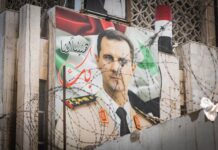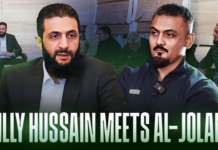Roshan Muhammed Salih reports from the famous Tartar town of Bakhchysaray on the trepidation residents feel ahead of a vote on March 16 which will most likely see Crimea opt to join Russia.
The town of Bakhchysaray in Crimea is the former seat of the Turkic Tatar khans who ruled Crimea from the 15th to 18th century before the region was conquered by Russia.
The centrepiece of the town is the amazingly beautiful Khan’s Palace which is like a miniature Topkapi Palace with wonderful Ottomon and Persian architecture, and elegant and serene gardens and mosques.
But when I visited on Monday there were more journalists than tourists who have obviously been deterred by the “Crimea on the Brink” type of headlines that the BBC and others are bandying about.

Moreover, the Tartar locals weren’t in the mood to talk to the Russian media, perhaps sensing that a word out of place could have negative repercussions. Foreign journalists, like myself, had better luck. The locals felt that we would broadcast their message more fairly and perhaps relevant international players would take note.
Vera Ibrahimova, who works as a tour guide at the Khan’s Palace, told me that Tartars are living in a state of panic.
“This is a war between two Slavic nations – the Russians and the Ukrainians – but we live peacefully here and we don’t want to be part of it,” she said. “As soon as the blood starts to run this could lead to really bad consequences.”
Subscribe to our newsletter and stay updated on the latest news and updates from around the Muslim world!
Ibrahimova was keen to stress that she respects the Russian people and language and especially the Russian businessmen who are bringing investment into the area. But in a reference to the pro-Russian forces who are emerging all over Crimea, she added that Russians should come here without weapons.
“People are living in panic right now and they don’t understand why this is happening. Of course the Ukrainian government was never perfect and they were not running the country fairly, but for ordinary people it isn’t easy to understand this complicated politics. Whatever Putin is trying to do it is still not right in the 21st century to allow troops into the country and to occupy territory – we are not living in mediaeval times.”
Deportation
At dhuhr prayers only five people turned up to pray in the town’s main mosque. Perhaps the presence of journalists put people off, or perhaps the years of exile many Tartars spent in the “atheist” Soviet Union had secularised them. For example, most Tartar women I saw in Bakcshysaray didn’t wear the headscarf and were indistinguishable in dress from Russian women. And I was told that many (men and women) claimed to be devout yet drank vodka just like everyone else.
But at a smaller mosque away from the town centre there were plenty of worshippers – mainly women in their 70s and 80s who had been deported by Stalin in 1944 and had come back to live in the area after Ukraine gained its independence. These women performed a communal dua ceremony beseeching Allah to make the Russian troops go away.
Shafiha Ismailova was only one year old when her family was forced into a cattle truck after being given only a few hours to grab their things and leave. Like hundreds of thousands of other Tartars she was sent to Central Asia as part of Joseph’s Stalin’s revenge after he accused the Tartars of siding with the Nazis during World War II.

Shafiha dreamed of returning to the land of her birth during her 62 years in Uzbekistan and that dream finally came true eight years ago. Her community built their homes and mosques on barren land after their return, and they say they won’t leave it again, no matter what Vladimir Putin wants to do with them.
Shafiha’s friend, Fatima Saifallaova, added that Tartars would boycott the March 16 vote.
“We always pray in good times and bad times but today we are praying for the occupiers to leave the town because they are bringing pain to us. I cry all day when I watch the TV, I am scared for my mother who was deported and hope she hasn’t got to go through it again. We live in a very beautiful land so it should be protected. We are not scared of the Russian people because we have lived together for 20 years. We have learned their language and sing the national anthem. We are only scared of Putin and the aggression of his politics.”
When President Yanukovich was deposed a few weeks ago thousands of Tartars demonstrated in the Crimean capital Simferopol to express their allegiance to Ukraine. This didn’t go down too well with many of the ethnic Russians who live in Crimea who still look to Mother Russia for protection.
And it is those Crimean Russians who form the majority here and are likely to ensure that Crimea joins the Russian Federation. Their confidence has been swelled in recent weeks by Russian troops on the ground and pro Russian defence forces patrolling the streets.
As for the Tartars, they have started to form their own “self defence units” to protect their neighbourhoods. And they have started to keep a lower profile, perhaps realising that Crimea’s future belongs to Russia no matter how they may feel about it and that a foreign knight in shining armour will not ride to their rescue.










![The Taliban’s Road To Success [Short Film]](https://5pillarsuk.com/wp-content/uploads/2024/11/Kabul-roadworks-thumbnail-218x150.png)









